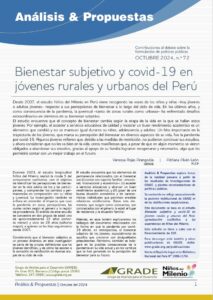Bienestar subjetivo y covid-19 en jóvenes rurales y urbanos del Perú
| Year | : | 2024 |
|---|---|---|
| Author/s | : | Vanessa Rojas, Adriana Alván León, |
| Area/s | : | Ethnicity, gender and citizenship |
Rojas Arangoitia, V. y Alván León, A. (2024). Bienestar subjetivo y covid-19 en jóvenes rurales y urbanos del Perú. Análisis & Propuesta, 72.
Since 2007, the Young Lives in Peru study has been collecting the voices of children – today youth or young adults – regarding their perceptions of well-being throughout the life cycle. In recent years, and as a consequence of the pandemic, youth – in both rural and urban areas – have faced extraordinary challenges in terms of their subjective well-being.
The study finds that the concept of well-being changes according to the stage of life in which these young people find themselves. For example, accessing quality educational services and showing good academic performance is an element that did not remain the same throughout their childhood, adolescence and adulthood. An important milestone in the trajectory of young people, which marks their perception of well-being in various aspects of their lives, was the covid-19 pandemic. Some young people report that, due to the restrictive measures, they were unable to continue their studies, and now consider that they are not doing well in life; others say that, although at some point they were forced to abandon their studies, thanks to the support of their family they were able to recover and resume them, something that will allow them to have a better job in the future.







